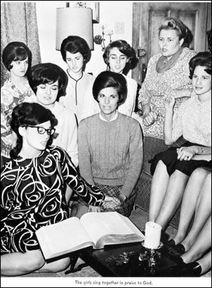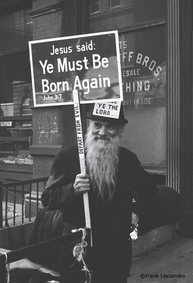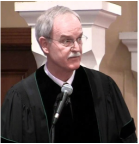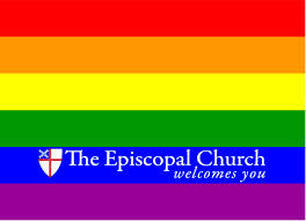| 3Jesus answered and said unto him, Verily, verily, I say unto thee, Except a man be born again, he cannot see the kingdom of God. 4Nicodemus saith unto him, How can a man be born when he is old? Can he enter the second time into his mother’s womb, and be born? 5Jesus answered, Verily, verily, I say unto thee, Except a man be born of water and of the Spirit, he cannot enter into the kingdom of God. 6That which is born of the flesh is flesh; and that which is born of the Spirit is spirit. 7Marvel not that I said unto thee, Ye must be born again. |
Born again! I saw some of you squirm. This term makes many of us uncomfortable. | Born again! I saw some of you squirm. This term makes many of us uncomfortable. It has become one of the commonest, least helpful clichés in the religious dialogue of our time. My guess is that, at some time in your life, those of you around my age have been asked (usually by a well-intentioned Christian) whether or not you have been “born again” – or whether or not you are a “born again” Christian. My guess is also that you may have had some legitimate difficulty answering. Fortunately, the Greek word here for “again” can also be translated “from above,” and, thankfully the Bible we use for public reading uses the latter. Unfortunately, we can’t know exactly what Jesus meant because he spoke Aramaic, and there is no Aramaic or Hebrew word that has both of these meanings. But, whether we read “born again” or “born from above,” the question I want to address today is, “What is Jesus trying to tell Nicodemus and us about what it takes to see and enter the kingdom of God by saying that we must experience a different kind of birth in order to do so”? At the very least, he seems to be implying that we must be willing to begin our lives again, to start over from scratch – to be, in some way, radically reinvented. But first, let me digress. |
 ACC yearbook, 1968. Photo courtesy of The Portal to Texas History, http://texashistory.unt.edu/
ACC yearbook, 1968. Photo courtesy of The Portal to Texas History, http://texashistory.unt.edu/ After my second year, for a number of reasons (mostly having to do with the pom-pom girl) I decided to transfer back to an Arizona school – the University of Arizona in Tucson. When I arrived on that campus, I discovered that it was very different from ACC. I kept falling off curbs and running into palm trees because women were wearing not only very short skirts and shorts – they were wearing tank tops (and only tank tops) on their upper torso. The hair and beards on many of the guys made them look like the characters on the inside of a Dutch Masters cigar box. Students drank beer in their dorm rooms and smoked reefers under the bushes on the grounds. My first few weeks were filled with sensory input overload – to include tear gas that wafted over to my dorm one evening from an anti-Vietnam War protest being dispersed by police near the campus entrance.
I started to notice some counter-cultural student types that were new to me. Many of them had long hair and beards, but they were talking about Jesus and being “born again.” They had custom latigo leather covers on their Bibles and wore very cool leather sandals. | Once I began to adjust to my new environment, I started to notice some counter-cultural student types that were new to me. Many of them also had long hair and beards, but they were talking about Jesus and – you guessed it – being “born again.” They had custom latigo leather covers on their Bibles and wore very cool leather sandals (both of which I learned later were made by local Christian leather craftsman). Being somewhat disillusioned at the time by institutions of all sorts, including the Church, these “Jesus People” intrigued me. So I decided to visit one of their meetings. I didn't want anything too charismatic, so I picked the Vineyard (unrelated to today’s Vineyard Christian Fellowship founded by John Wimber), an evangelical, non-denominational Christian coffee house (with very bad coffee – this was pre-Starbucks) a few blocks from campus where a bunch of these folks hung out. |
 "Born Again" copyright Frank Lisciandro (franklisciandro.com)
"Born Again" copyright Frank Lisciandro (franklisciandro.com) Sadly, since the late 1960’s, Jesus’ language (especially the King James version thereof) has been popularized, politicized, hackneyed, clichéd and misused. It has been used as a Christian code for someone who is a “true” Christian – not just a nominal Christian; for someone who has a certain interpretive view (usually literalist) of the Bible; for someone whose life has been dramatically changed for the better by religion; for someone who has received the “gift of the spirit” (usually speaking in tongues); for someone who has had a dramatic conversion experience; for someone who has been baptized by immersion; for someone who has said the sinner’s prayer; for someone who is saved from Hell and locked-in on a trajectory for Heaven when he dies; for someone who agrees with me about what constitutes “real” Christianity; or for someone who incorporates any combination of the characteristics above.
So what was Jesus trying to communicate when he told Nicodemus, “Ye must be born again” – or “born from above”? Is there something in this language that we can connect with today that does not simply “spin” and pervert Jesus’ message in order to appeal to our post-modern sensibilities? There may be.
Traditionally, Christians have interpreted a new birth by water and Spirit as a profound conversion experience and baptism – leading to a radical change in behavior and practice. This kind of experience is portrayed in the adult conversion stories in the book of Acts (like those on the day of Pentecost and that of St. Paul), and seems to have been common for early Christians. It has worked for many Christians over the centuries. This interpretation of being “born again” accurately depicts the experience of my brother-in-law. He was a new and changed man after accepting Jesus as his Savior and being baptized. But it isn’t representative of all Christian experience. What about those of us who were raised in Christian families and who were baptized as infants or young adults – those of us who have never “not known” Jesus? Do we even need to be reborn of water and Spirit – and if so, how might it happen? I think we do. I think it might happen during serendipitous sacramental encounters with physical elements of creation (such as water) in tandem with the movement of God’s Spirit.
After that experience, my spiritual journey “started again.” | In my own case, even though I had grown up believing in Jesus and was baptized by immersion at the age of 13, I had come to believe that being a real Christian who could be “saved” was impossible – especially with hormones. My first memorable spiritual reinvention occurred at Abilene Christian College in Tony Ash’s class on the life and teachings of Jesus. During that class, after spilling a styrofoam cup of coffee on the crotch of his slacks and creating an apron covering the affected area with his suit coat by tying the sleeves, he continued his lecture from Luke noting that our salvation depended, not on what we do, but on what Jesus did. I was awake and paying attention because of the physical mishap (could spilled coffee be a sacrament?), and I understood intellectually and emotionally for the first time that my life was not all about me. It was about God’s love and the power of the Spirit to change my life – it was, in fact, possible to be a “saved” Christian. After that experience, my spiritual journey “started again.” |
| And what about those of us who want to follow Jesus but are perpetual skeptics? What about those of us who have trouble believing in miracles, reconciling the history of the Church with a God of love, defending the claims of Christian doctrine in the face of new scientific discovery, and applying the critical methods of philosophy to faith? Can those of us who can’t buy the whole traditional Christian enchilada be “born again”? I think so. To the degree that we are able to see in Jesus’ love the very nature of the eternal Creator, and to the degree that God can touch our souls with that love through the elements of creation (such as water) and the indwelling of the Spirit, there is every possibility, in spite of our skepticism, that we can be “born again” – and perhaps more than once. I may have been “born from above” the first time I attended the Vineyard, experiencing God’s love through the sound and rhythms of the music, the odd physicality of the space, and the obvious presence of God’s Spirit in the students gathered there – because, after that experience, my spiritual journey “started again.” It may have also happened the first time I attended an Easter Vigil service at St. Mark’s, experiencing God’s love through the candlelight, the air filled with incense, and Jesus’ palpable presence in the darkened tomb-like nave followed by a shower of light and ringing bells when we sang the Gloria and celebrated his resurrection – because after that experience my spiritual journey “started again.” | To the degree that we are able to see in Jesus’ love the very nature of the eternal Creator, and to the degree that God can touch our souls with that love through the elements of creation (such as water) and the indwelling of the Spirit, there is every possibility, in spite of our skepticism, that we can be “born again” – and perhaps more than once. |
Jn 3:1-17 (NRSV)
Now there was a Pharisee named Nicodemus, a leader of the Jews. 2He came to Jesus by night and said to him, “Rabbi, we know that you are a teacher who has come from God; for no one can do these signs that you do apart from the presence of God.” 3Jesus answered him, “Very truly, I tell you, no one can see the kingdom of God without being born from above.” 4Nicodemus said to him, “How can anyone be born after having grown old? Can one enter a second time into the mother’s womb and be born?” 5Jesus answered, “Very truly, I tell you, no one can enter the kingdom of God without being born of water and Spirit. 6What is born of the flesh is flesh, and what is born of the Spirit is spirit. 7Do not be astonished that I said to you, ‘You must be born from above.’ 8The wind blows where it chooses, and you hear the sound of it, but you do not know where it comes from or where it goes. So it is with everyone who is born of the Spirit.” 9Nicodemus said to him, “How can these things be?” 10Jesus answered him, “Are you a teacher of Israel, and yet you do not understand these things? 11“Very truly, I tell you,
we speak of what we know and testify to what we have seen; yet you do not receive our testimony. 12If I have told you about earthly things and you do not believe, how can you believe if I tell you about heavenly things? 13No one has ascended into heaven except the one who descended from heaven, the Son of Man. 14And just as Moses lifted up the serpent in the wilderness, so must the Son of Man be lifted up, 15that whoever believes in him may have eternal life. 16“For God so loved the world that he gave his only Son, so that everyone who believes in him may not perish but may have eternal life. 17“Indeed, God did not send the Son into the world to condemn the world, but in order that the world might be saved through him.
Of Time and Memory: My Parents' Love Story, Don J. Snyder
“Let us hope that we are all preceded in this world by a love story.”



 RSS Feed
RSS Feed

